
Transition Economies in Central and Eastern Europe
Routledge (Verlag)
978-1-032-51810-7 (ISBN)
The book is divided into four sections. The first part presents the Austrian perspective on socialism; the second discusses a new approach to the Austrian theory of interventionism, suggesting that the theory should be revised and that its scope should be extended beyond the transformation of the 1990s into the realm of contemporary economic reality; the third part is oriented towards pragmatic considerations, whereby the authors employ the Austrian perspective to analyze specific factors that, according to their view, had an impact on the transformational success of post-communist countries; while the final part is ideological and philosophical in character. Here the authors search for certain principia that govern broadly understood social and economic transformations.
The book is addressed to those interested in the Austrian School of Economics and the political transformation of the 1990s, as well as those who wish to understand contemporary economic trends.
Alicja Sielska is Assistant Professor in the Institute of Economic Sciences in the Faculty of Law, Administration and Economics at the University of Wroclaw, Poland and Researcher at the University of New York, Prague, Czech Republic.
Introduction (Alicja Sielska) PART I – PRIMER Chapter 1. The Failure of Socialist Central Planning and the Negative Effects from Implementing ESG (Richard Ebeling) Chapter 2. "Carl Menger and the Post-Soviet Transition of Central and European Economies" (Barbara Kolm) PART II – NEW PERSPECTIVES IN THE THEORY OF INTERVENTIONISM Chapter 3. "The Disinterventionist Spiral and the Transition Process in Easten and Central Europe" (Philipp Bagus) Chapter 4. "Free-trade, stable money and market reforms by top-down design Misesian "desperado policy" as daily routine" (Josef Šíma) Chapter 5. "Röpke and his theory of deglobalization. An application to understand current perspectives" (David Sanz-Bas, Miguel Ángel Echarte, Satheesh Varghese, Sergio Náñez) PART III – ECONOMIC TRANSITIONS EXPLAINED Chapter 6. "Entrepreneurship and black markets under socialism. The case of former Eastern bloc" (Gabriel Mursa) Chapter 7. From Power to Market: The Transformation of Centrally Planned Economies and the Theories of Institutional Change (Marek Hudik, Shahab Sharfaei) Chapter 8. The Role of Foreign Capital in Economic Transformation in Poland (Mateusz Benedyk) Chapter 9. "How far are CEE economies from free-market ideals? A look from the point of view of the Austrian School of Economics theory." (Marcin Mrowiec) PART IV – SOCIAL AND ECONOMIC TRANSITIONS: PATTERNS, VALUES AND IDEAS Chapter 10. "Identifying Bottlenecks of Transformation (Mateusz Machaj) Chapter 11. "The Proactive Society: An Introductory Exposition" (Jakub Bożydar Wiśniewski) Chapter 12. "Poverty Relief as a Rule-Based Discovery Procedure: Is a Basic Income Compatible with a Hayekian Welfare State" (Otto Lehto) Chapter 13. Justice in the 21 st Century: Epistemic Argument that Rawls was Wrong (Žiga Turk)
| Erscheinungsdatum | 08.03.2024 |
|---|---|
| Reihe/Serie | Routledge Studies in the European Economy |
| Zusatzinfo | 8 Tables, black and white; 9 Line drawings, black and white; 9 Illustrations, black and white |
| Verlagsort | London |
| Sprache | englisch |
| Maße | 156 x 234 mm |
| Gewicht | 367 g |
| Themenwelt | Geschichte ► Teilgebiete der Geschichte ► Wirtschaftsgeschichte |
| Sozialwissenschaften ► Soziologie ► Spezielle Soziologien | |
| Wirtschaft ► Allgemeines / Lexika | |
| Wirtschaft ► Volkswirtschaftslehre | |
| ISBN-10 | 1-032-51810-3 / 1032518103 |
| ISBN-13 | 978-1-032-51810-7 / 9781032518107 |
| Zustand | Neuware |
| Informationen gemäß Produktsicherheitsverordnung (GPSR) | |
| Haben Sie eine Frage zum Produkt? |
aus dem Bereich


